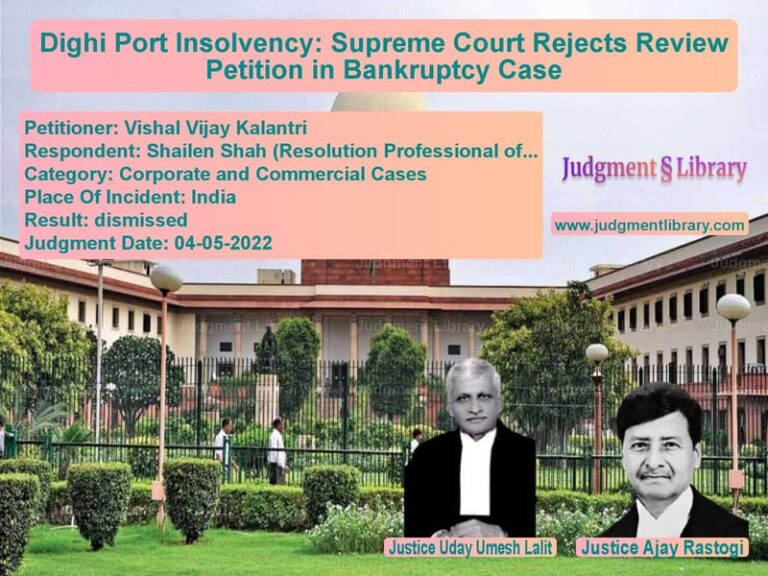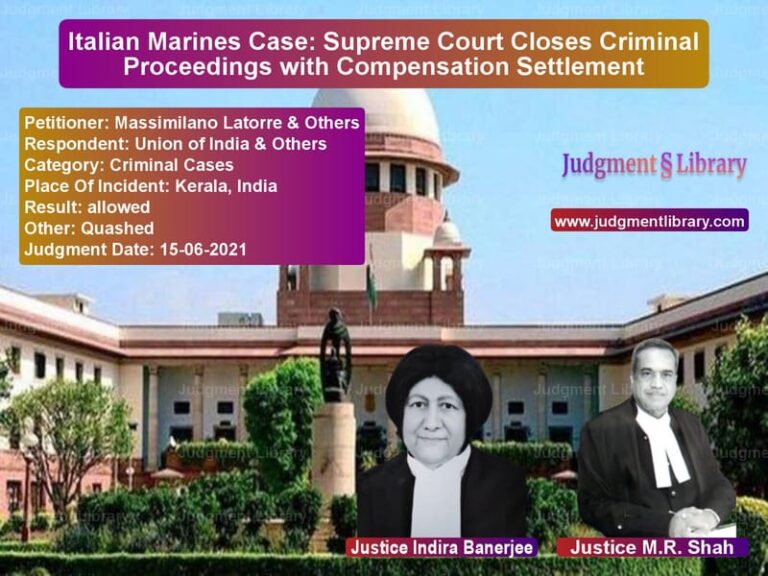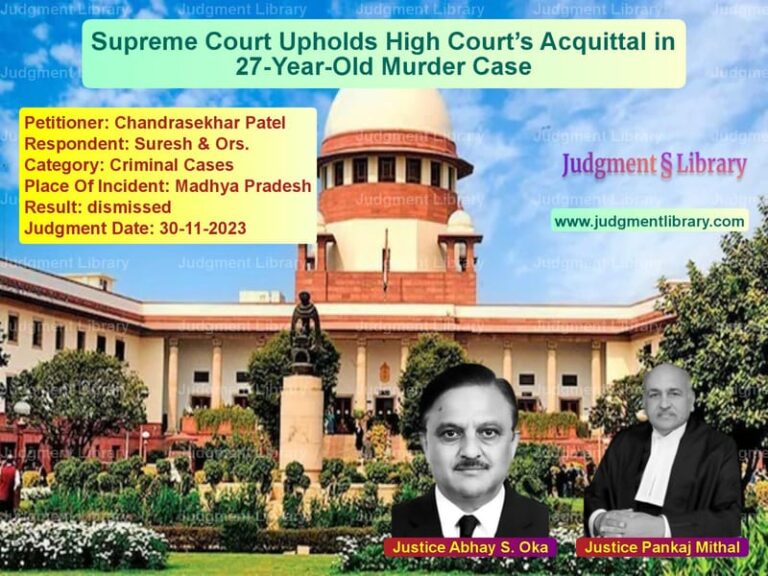State vs. Komal Lodha: Supreme Court Reduces Death Penalty to Life Imprisonment
The case of The State of Rajasthan vs. Komal Lodha revolves around the controversial issue of whether a death penalty sentence, imposed on the accused, should be commuted to life imprisonment. The Supreme Court, in its judgment dated January 13, 2023, examined the decision made by the Rajasthan High Court, which had previously commuted the death penalty. The Court’s ruling addressed concerns regarding the adequacy of the High Court’s analysis and ultimately upheld the commutation of the death penalty to life imprisonment, though it expunged certain unwarranted remarks made by the High Court.
Background of the Case
The appellant, Komal Lodha, was convicted for the brutal murder of Rita Kumari, a crime that had been committed with extreme violence. The initial trial court convicted the accused under Section 302 IPC (for murder) and sentenced him to death. However, the High Court later commuted the death penalty to life imprisonment, after considering the aggravating and mitigating factors surrounding the case. The state of Rajasthan, aggrieved by this decision, appealed to the Supreme Court, urging for the reinstatement of the death penalty.
The State argued that the High Court had failed to properly evaluate the gravity of the crime and the accused’s role in it. Furthermore, the High Court made certain comments regarding the investigation and the legal process, which the State found to be inappropriate and prejudicial. These remarks were challenged by the State as being legally untenable and irrelevant to the question of punishment.
Legal Issues Examined
- Should the death penalty imposed on the accused be reinstated or commuted to life imprisonment?
- Did the High Court make unwarranted observations regarding the investigation and the fairness of the proceedings?
- Were the mitigating and aggravating circumstances properly weighed in determining the sentence?
Petitioner’s (State) Arguments
The State of Rajasthan contended that:
- The High Court failed to consider the extreme nature of the crime, which involved severe violence and brutality.
- The accused had shown no remorse for the crime, and the death penalty was justified based on the heinous nature of the offense.
- The High Court’s comments on the investigation and on the accused’s appeal process were not only unjustified but also contrary to established legal norms.
- The High Court should not have commuted the death sentence without fully considering the implications of the offense committed.
Respondent’s (Komal Lodha) Arguments
The respondent (Komal Lodha) argued that:
- The High Court had properly considered both the aggravating and mitigating factors before commuting the death penalty to life imprisonment.
- The comments made by the High Court were meant to highlight potential procedural lapses in the investigation and were not intended to undermine the integrity of the judicial process.
- The respondent had shown remorse for the crime and had reformed during his time in custody, justifying a sentence of life imprisonment.
- The State’s appeal was based on emotions and did not provide sufficient legal reasoning to overturn the High Court’s judgment.
Supreme Court’s Observations
The Supreme Court, comprising Justice M.R. Shah and Justice S. Ravindra Bhat, carefully scrutinized the judgment of the Rajasthan High Court and the arguments presented by both parties. The Court made several key observations:
“While the High Court did exercise its discretion in commuting the sentence from death to life imprisonment, the observations made in paragraph 42 regarding the investigation were inappropriate. It is against judicial propriety to make such remarks after this Court had already confirmed the conviction and sentence in a prior ruling.”
The Court noted that the High Court had erred in making critical comments about the investigation and the fairness of the proceedings, especially after this Court had previously reviewed and upheld the conviction. Furthermore, the Court emphasized:
- The death penalty is a harsh punishment and should be imposed only in the rarest of rare cases. In this case, the High Court’s decision to commute the death sentence was justified based on the consideration of mitigating factors such as the accused’s mental state and background.
- The High Court had properly weighed the aggravating factors, including the brutality of the crime, while also considering the personal circumstances of the accused.
- While the respondent had committed a heinous crime, the mitigating circumstances outweighed the need for a death sentence in this particular case.
Final Judgment
The Supreme Court ruled that:
- The observations made by the High Court in paragraph 42 of the judgment were unwarranted and should be expunged.
- The High Court’s decision to commute the death sentence to life imprisonment was upheld, as it was based on a proper evaluation of the mitigating and aggravating circumstances.
- The appellant’s conviction for murder under Section 302 IPC was not overturned, but the sentence was confirmed as life imprisonment.
Implications of the Judgment
This ruling has significant implications for the application of the death penalty in India:
- Clarification on the Use of the Death Penalty: The judgment reinforces the principle that the death penalty should be applied only in rare cases of extreme brutality.
- Judicial Discipline: The Court’s decision to expunge the High Court’s unwarranted remarks highlights the importance of judicial discipline and respect for the legal process.
- Impact on Future Death Penalty Cases: The ruling will serve as a precedent for cases involving the commutation of death sentences, ensuring that both aggravating and mitigating factors are properly considered.
Conclusion
The Supreme Court’s ruling in State of Rajasthan vs. Komal Lodha demonstrates the Court’s balanced approach in reviewing death penalty cases. By upholding the High Court’s decision to commute the sentence to life imprisonment, the Court ensured that the principle of proportionality in sentencing was respected while also addressing concerns about judicial propriety in making unwarranted remarks on investigations. The decision serves as a vital precedent in the application of the death penalty and reinforces the importance of both fairness and rigor in the judicial process.
Petitioner Name: State of Rajasthan.Respondent Name: Komal Lodha.Judgment By: Justice M.R. Shah, Justice S. Ravindra Bhat.Place Of Incident: Rajasthan, India.Judgment Date: 13-01-2023.
Don’t miss out on the full details! Download the complete judgment in PDF format below and gain valuable insights instantly!
Download Judgment: state-of-rajasthan-vs-komal-lodha-supreme-court-of-india-judgment-dated-13-01-2023.pdf
Directly Download Judgment: Directly download this Judgment
See all petitions in Murder Cases
See all petitions in Bail and Anticipatory Bail
See all petitions in Attempt to Murder Cases
See all petitions in Judgment by Mukeshkumar Rasikbhai Shah
See all petitions in Judgment by S Ravindra Bhat
See all petitions in partially allowed
See all petitions in Modified
See all petitions in supreme court of India judgments January 2023
See all petitions in 2023 judgments
See all posts in Criminal Cases Category
See all allowed petitions in Criminal Cases Category
See all Dismissed petitions in Criminal Cases Category
See all partially allowed petitions in Criminal Cases Category







